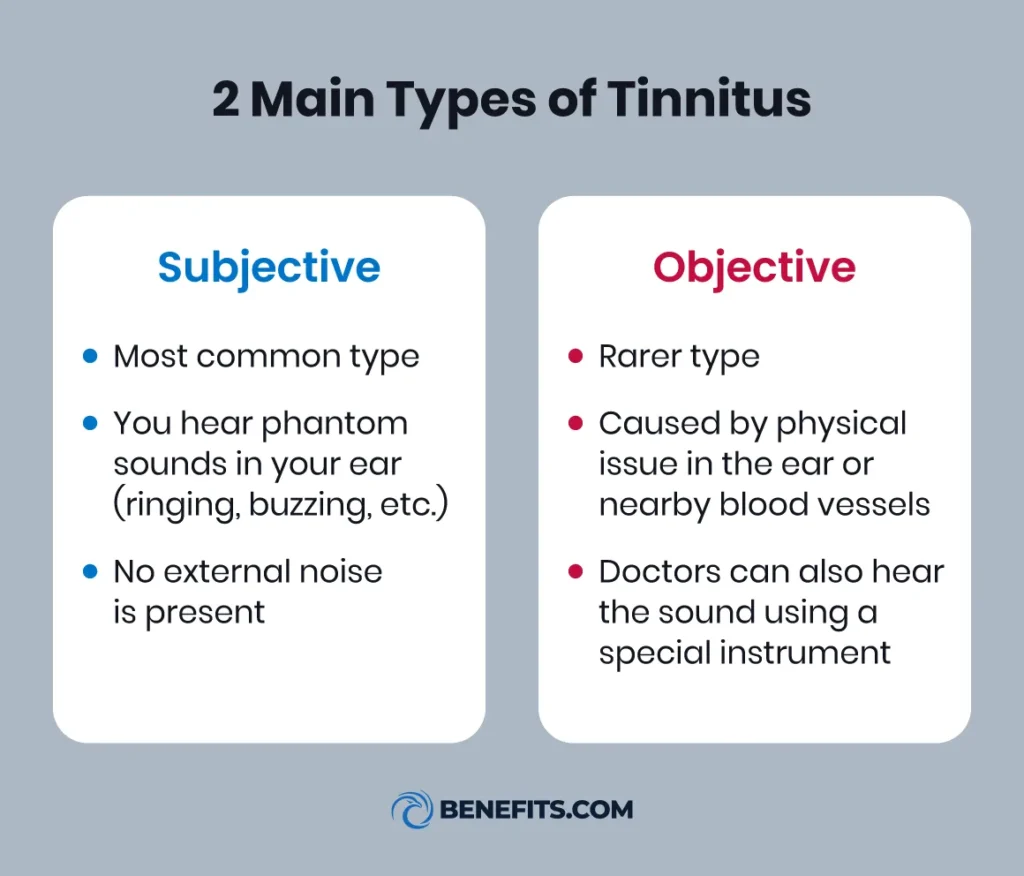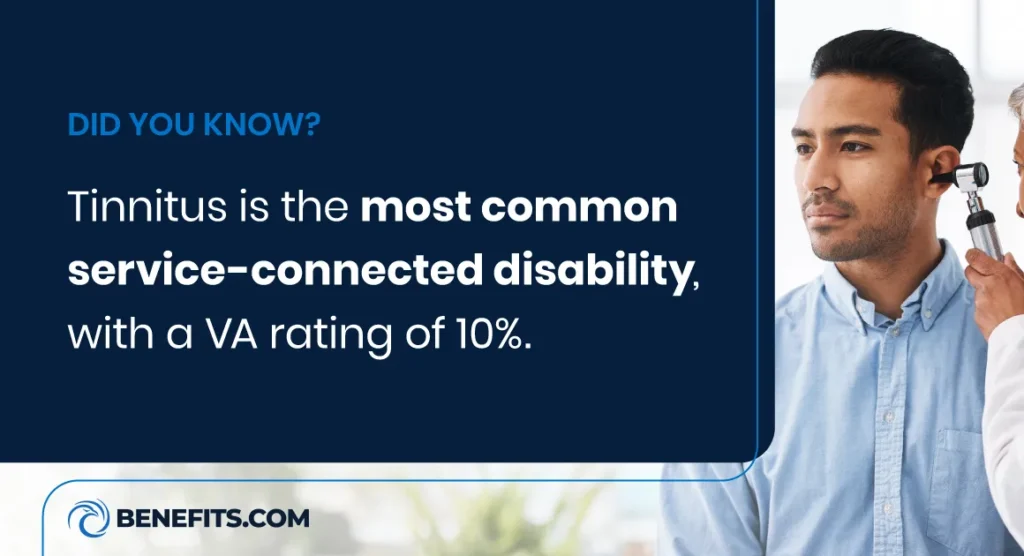According to the 2023 VBA Annual Benefits Report, tinnitus is the most prevalent service-connected disability for veterans seeking compensation. This condition causes a perceived noise in the ear, despite no external sound.
While tinnitus can arise from various causes, veterans are especially susceptible due to potential noise exposure during military service. If you’re a veteran experiencing these symptoms, you’re not alone. This guide will delve into everything you need to know about tinnitus VA ratings, the claims process, and how to get the benefits you deserve.
What Is Tinnitus?
Tinnitus is a condition that causes a person to hear a sound in their ear even though there is no outside noise. Most people associate ringing in the ear with tinnitus, but other tinnitus symptoms include hissing, buzzing, or whistling in the ear. Tinnitus can occur alone or as a symptom of another illness.
There are two types of tinnitus:
- Subjective tinnitus: This is the most common type, where you hear a noise in your ear that isn’t produced by an external source. Only you can hear this sound.
- Objective tinnitus: This is much rarer, occurring in only about 1% of patients. In this type, a doctor can also hear the sound using a special instrument. It’s usually caused by a blood vessel condition.

Symptoms of Tinnitus
Tinnitus can manifest in a variety of ways, though the most common symptom is hearing a sound in your ear(s) even when no external noise is present. This sound can take many forms, but some of the most frequent descriptions include:
- Ringing
- Buzzing
- Hissing
- Whistling
- Roaring
- Clicking
The severity of tinnitus symptoms can also vary greatly. Some people may experience barely noticeable sounds, while others may find the tinnitus sounds constant and disruptive to their daily lives.
Causes of Tinnitus
There is no one definitive factor doctors can pinpoint as a cause for tinnitus. Several reasons can lead to tinnitus, including:
- Exposure to loud noise
- Age-related hearing loss
- Earwax buildup
- Ear infections
- Meniere’s disease
- Changes in the ear bones
- Head or neck trauma
- TMJ disorders
- Circulatory system disorders
- Stress and anxiety
Is Tinnitus a Disability?
Yes, tinnitus can be considered a disability, especially if it’s chronic and significantly impacts your daily life. In fact, tinnitus is the most common service-connected disability claim filed by veterans.
However, the VA does not consider it an overburdening condition that impairs you from living your life. This condition will merit a 10% VA disability rating, meaning you will receive a small compensation.

How Does the VA Rate Tinnitus?
The VA assigns a 10% disability rating for tinnitus, regardless of how many ears are affected. However, the VA can also compensate for hearing loss if it’s present alongside tinnitus. It’s important to file for both conditions if you have them.
Even if you experience hearing loss after discharge, you can still claim it if you can prove frequent exposure to loud noises during service. Buddy statements from fellow veterans can be helpful evidence.
Is Tinnitus a Permanent VA Disability?
Yes, tinnitus is considered a permanent VA disability. However, the VA can reassess your condition to see if your symptoms have improved. This typically happens within the first few years after you receive your disability rating.
If the VA finds that your condition has improved or gone away, your disability rating will be reduced. As always, you have the right to appeal this decision and consult a veterans disability lawyer.
Other Conditions Connected With Tinnitus
Tinnitus often occurs alongside other health issues that can worsen your symptoms and impact your daily life. Here are some common examples:
- Hearing loss: This frequently occurs with tinnitus.
- Mental health conditions: Anxiety, depression, and PTSD can be triggered by or worsen tinnitus.
- TMJ pain: Jaw joint problems like TMJ can contribute to tinnitus.
- Sleep disorders: Trouble sleeping can worsen tinnitus and vice versa.
The VA considers how tinnitus affects your overall health when assigning a disability rating. If you have any of these conditions alongside tinnitus, be sure to mention them during your claim process.
How To Qualify for VA Benefits for Tinnitus
To qualify for VA benefits for tinnitus, you must meet specific criteria established by the VA. Here’s what you’ll need to qualify for veterans benefits for tinnitus.
Receive a Diagnosis
First, you’ll need to receive a tinnitus diagnosis from a qualified health care provider. The doctor will document your symptoms, including the type of sound, severity, and duration. This medical proof can be from a military treatment facility or a civilian doctor.
Gather Evidence of Tinnitus Symptoms
Evidence of the severity of your tinnitus symptoms is crucial for your benefits claim. This may include:
- Medical records mentioning tinnitus or hearing problems, including onset date, frequency and duration of symptoms, severity of sound, and how tinnitus impacts your daily life
- Military medical records mentioning hearing problems, noise exposure incidents, or head injuries
- Deployment records from war zones or operations with loud noises (explosions, gunfire)
- Buddy statements from fellow veterans who can vouch for witnessing your tinnitus symptoms and potentially link them to service-related noise exposure
Attend a Compensation and Pension (C&P) Exam
Once you submit your claim, the VA will schedule a C&P exam with a doctor who specializes in hearing conditions. During the exam, the doctor will review your medical records, ask you questions about your tinnitus and service history, and may perform a hearing test.
Be prepared to discuss your tinnitus symptoms in detail and explain how they may be related to your military service.
Establish a Service Connection (Nexus)
The VA needs a link between your tinnitus and your service. You can often establish a service connection through a nexus letter written by a medical professional who can connect your service-related noise exposure to your current tinnitus.
Frequently Asked Questions
Is It Hard To Get VA Disability for Tinnitus?
While tinnitus is the most common service-connected disability for veterans, getting approved for benefits can be challenging. The VA needs to see a clear link between your tinnitus and your military service. This often involves providing strong evidence of both your tinnitus symptoms and noise exposure during your service.
How Much Does the VA Pay for Tinnitus?
The VA disability rating for tinnitus itself is typically 10%, which equals $171.23 in monthly compensation in 2024.
However, veterans with tinnitus and additional service-connected disabilities may qualify for a higher rating based on the combined effects of their conditions.
Is the VA Doing Away With Tinnitus?
No, the VA is not doing away with tinnitus as a service-connected disability. However, there have been some recent changes to the VA Schedule for Rating Disabilities (VASRD) that affect tinnitus ratings.
Previously, tinnitus received a standalone 10% disability rating. Now, the VA may consider tinnitus as part of a broader service-connected condition, such as PTSD or hearing loss. This doesn’t mean veterans will lose their benefits, but it could affect how their tinnitus is evaluated and potentially impact the disability rating assigned.
It’s important to note that these changes are still being implemented, and veterans who already receive benefits for tinnitus are typically legacied in under the old system.
Benefits.com Can Help You With Your Tinnitus Disability Claim
While the tinnitus VA rating starts at 10%, veterans with severe symptoms affecting daily life may qualify for a higher rating. If you’re experiencing significant challenges due to tinnitus, be sure to document your symptoms thoroughly when applying for benefits.
Benefits.com is here to help veterans navigate the VA claims process for tinnitus and other service-connected disabilities. To learn more, take our Benefits Quiz and find other benefits you may qualify for.
 Benefits.com Advisors
Benefits.com Advisors
With expertise spanning local, state, and federal benefit programs, our team is dedicated to guiding individuals towards the perfect program tailored to their unique circumstances.
Rise to the top with Peak Benefits!
Join our Peak Benefits Newsletter for the latest news, resources, and offers on all things government benefits.



















